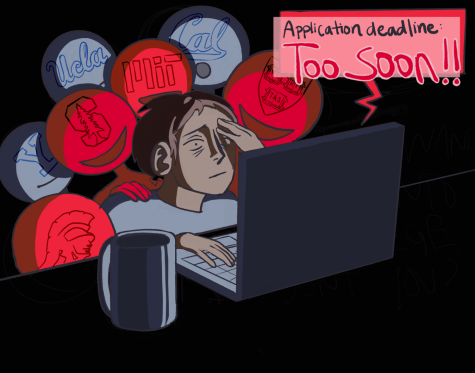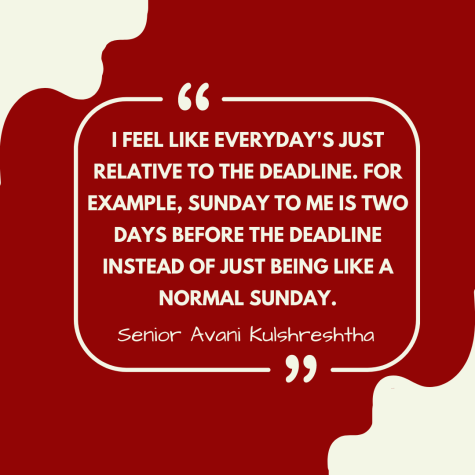Drowning in stress
Looming college application deadlines cause stress for seniors
November 2, 2022

According to PrepScholar, early action deadlines for seniors typically range from Nov. 1 to Nov. 15, in addition to the regular application deadline in January. The approaching deadline for early action is putting more seniors under pressure to complete their applications in time, while concurrently balancing the stress of school workload. For example, a major challenge senior Avani Kulshreshtha faces is the anxiety of consistently keeping track of college application dates, in addition to tests.
“I think that as deadlines approach, there’s definitely a countdown in the back of my head,” Kulshreshtha said. “I feel like everyday’s just relative to the deadline. For example, Sunday to me is two days before the deadline instead of just being like a normal Sunday.”
 Senior Vani Putheti echoes Kulshreshta’s sentiment and believes that a key factor in her experience as a college applicant is the importance of managing deadlines.
Senior Vani Putheti echoes Kulshreshta’s sentiment and believes that a key factor in her experience as a college applicant is the importance of managing deadlines.
“I’m worried that I’m going to miss something like letters of [recommendation],” Putheti said. “I [asked] teachers about letters of recommendation, but I don’t think they’ve started writing mine, [so] I’m just worried about deadlines.”
College and Career Advisor Rogelio Canderon agrees that deadlines are an important factor to consider in the college application process, and believes that seniors should understand the importance of keeping track of major application dates.
“The college application season is a really tight season, and there are specific dates and deadlines that need to be followed through,” says Calderon. “And if you don’t follow through with them, then universities will not [be like] teachers here where [there is flexibility] about what the deadlines are.
Another factor for stress is money, a topic that Kulshreshtha finds especially important. With students applying to numerous universities, application fees — in addition to any additional costs — can pile up quickly.
“I feel like I’m in a position where it pinches a little just to be pressing that button [to pay] $75 per college, but I’m not in a position where I can’t afford to do so,” says Kulshreshtha. “So it’s not something that is always biting away at me, but I think it’s messed up that [a student] has to pay just to apply. And I think it’s even more severe to pay just to send in test scores.”
In addition to fees, prestige is a common theme that can negatively impact a student’s mental health when applying to several schools. While many seniors consider prestigious universities a key factor in applications, Calderon believes it should not be the only factor in selecting universities. He comes across many cases where students rely on Google to research the “best university for engineering programs.” In doing so, Calderon believes that these students are not doing sufficient research into their college application process.
However, Putheti believes her mindset has changed over time and says prestige is not something she is concerned as much about anymore.
“I was younger, but I think I’ve kind of grown out of [prestige],” Putheti said. I don’t really care anymore [because] I can say confidently that I’m not applying to any colleges just because of the name.”
At the end of the day, Calderon says that realizing what a student is capable of doing and not doing is especially important, and seeking help will help ease high stress levels.
“When you put time and energy into focusing on what matters, that’s going to help support you, and you’re gonna feel better than focusing on the things that don’t matter, which you just don’t have control over,” Calderon said. “So just being kind to yourself, seeking support in the process, and just knowing that it [will be] over at some point [is important].”
















